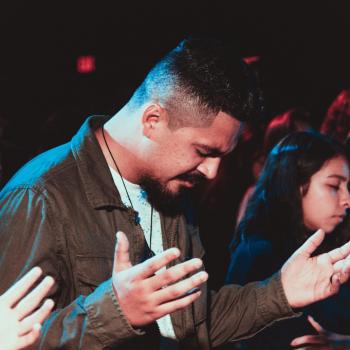Lamentations 3:19-24 Trust in the Faithfulness of God
INTRODUCTION
Do you know someone that you had problems trusting? How do you go about trusting in someone? One definition of trust is to place your hopes and dreams under someone’s authority.
For example, Heike can trust me when I tell her that I will do something for her. She can set her hope on what I say because I have been able to do them in the past. She can trust me with helping her with some household chores. I am faithful in cooking, taking out the trash, and cleaning the guest room. Heike does a lot more work around the house. She washes and irons and cleans the bathroom, bedroom, and living room. But I help her with these chores. I am faithful and reliable in most of my jobs, except one – the office.
As far as the office is concerned, I am not as faithful. When I tell Heike that I will clean the guest room, she can believe me, and she puts her hopes in the fact that I will do what I promise her. When I tell her that I will clean the office, she expresses doubt. Why? Because in the past, I have not been as faithful in cleaning the office room every time. Sometimes, I was not able to clean this room. As a result, Heike cannot place her hope in the fact that I will clean the office.
This is the basis of trust. To be faithful in doing what you say you have the authority to do.
BACKGROUND
Jeremiah wrote this letter. He is crying about the destruction of the Temple in Jerusalem. He is literally crying from A to Z. When you read this book in the original Hebrew, each verse starts with a certain letter. It may not be noted in your Bible, but in mine, it shows that each set of about four verses each begin with a certain letter. It starts with Aleph and goes all the way to Tav for each chapter.
Jeremiah mourns, laments, and cries about the destruction of the Temple in Jerusalem that happened in 586 BC. He cries because the people have put their trust and set their hope in the “faithfulness” of the Temple. They believed that the Temple would be there for them. The symbol of God was the Temple. But the symbol is not trustworthy. God is.
We have to go from trusting the symbols of God to God Himself.
A woman/man of God can live by faith because God is faithful.
TRUST IN THE FAITHFULNESS OF GOD
You situation may seem hopeless. You can remind God about it. (3:19)
(God) keep recalling my impoverished condition, my misery feels like bitter poison. (Lamentations 3:19 Erwin)
Jeremiah reminds God of his situation in life.
“God, you need to remember my situation.”
“I don’t have a place to live.”
“My life is miserable.”
“I’m going through a rough time, have been for some time now.”
“I’m asking you God to remember what has happened to me.”
Have you ever thought to remind God about your situation? You can. It is called prayer. But it should not end there.
Your strength may have turned into weakness. You can recognize your need for God. (3:20)
I continually remember as my strength continues to leave. (Lamentations 3:20 Erwin)
I remember it all–oh, how well I remember– the feeling of hitting the bottom. (Lamentations 3:20 MSG)
Jeremiah becomes depressed when he looks at his situation. His situation seems hopeless. Jeremiah is homeless and hopeless. He looks to his circumstances and to his physical condition. But whenever you look to your events around you and when you look to yourself, you will never find a solution to your problems. You have to look to someone else – Someone that is bigger than you and your circumstances.
This I recall to my mind, therefore I have hope. (Lamentations 3:21 NKJV)
Yet I still dare to hope when I remember this: (Lamentations 3:21 NLT)
But Jeremiah turns in his thoughts. He realizes that He needs to look to God. But how does He look to God. Jeremiah starts with “this” I recall to my mind. What is “this” that Jeremiah remembers that gives him hope?
John Calvin believed that Jeremiah was referring to his weaknesses. Calvin said: “his very weakness, (whether of condition or person), gives him hope of God interposing His strength for him.”
In other words, the deep suffering in verse 3:19 forms the foundation for the request in 3:20,and thus the remedy in verses 3:21-24.
Your salvation (your entire life even) is through God alone. In every circumstance, you have to place your heart and your hope under His faithful love. (3:21-24)
THE COMPASSION OF GOD
(Because of) the faithful love of God, we does not completely end; His compassions never end. (Lamentations 3:22 Erwin)
God’s love serves as the foundation for His character and His actions. God’s love is the foundation for every other thing that He does. He does not do something without loving. God’s compassion comes from His love. The word for “compassion” is plural here.
Because of the LORD’s faithful love we do not perish, for His mercies never end. (Lamentations 3:22 HCSB)
In its singular form in Hebrew, the word for compassion means womb.
by the God of your father who helps you, and by the Almighty who blesses you with blessings of the heavens above, blessings of the deep that lies below, and blessings of the breasts and the womb. (Genesis 49:25 HCSB)
But here in Lamentations, Jeremiah has in mind the tenderness of God. Just as a womb as the birthplace of the baby is the most tender place for a baby, a place of love and compassion. The womb is the place where the baby knows the of the faithfulness and compassion of the mother most intimately. The womb is the physical source of this love, compassion and faithfulness. God’s compassion and love are the source of of faithfulness to you as well.
God will be as compassionate to you when you fall on hard times, in the same way that a pregnant mother will show compassion to her baby. But unlike the womb of the mother, God’s compassion never ends.
THE FRESH COMPASSION OF GOD
Fresh, in the morning, are they (compassions); abundant (is your) faithfulness. (Lamentations 3:23 Erwin)
Great is his faithfulness; his mercies begin afresh each day. (Lamentations 3:23 NLT)
THE COMPASSION OF GOD WHEN YOU SLEEP
Do you want to see how compassionate God is? Go to sleep.
When you wake up, you’ve just experienced the first act of God’s compassion. In our scientific modern wold, we talk about going to sleep and staying unconscious. But in reality, God lets you rest and then He wakes you up. Have you ever noticed how consistent that is? You could die in your sleep, but God wakes you up. This is fresh
every morning.
THE COMPASSION OF GOD IS LIKE A MAC, NOT LIKE WINDOWS
Microsoft has just released its new version of Windows called Vista. Windows is what lets you see what is going on in your computer, if it is a normal PC. But if you are like me, you just got used to Windows XP and you fear the change that may come with a new Windows. I read about a guy who bought it and tested it. He said that you needed a very fast and reliable computer to run it. To install Vista, it took him two hours. But then he had to let the computer restart (or reboot) itself at least ten times throughout the night. He was just hoping that Windows Vista would be faithful and work when he turned on the computer th next morning. God is not like that.
The compassion of God is more like a Mac and less like Windows.
I love this verse. To me, it is one of the most beautiful verses in the Bible. I can trust God every morning. Every day He is faithful to lead me.
God is everything, He is all that I have. With my whole being, I will place my hope in Him. (Lamentations 3:24 Erwin)
The LORD is all I have, and so in him I put my hope.
(Lamentations 3:24 GNB)
I will trust Him with my life.
Not just my Sundays,
nor just my sad days,
nor just my house group days,
or just my “I-think-I-need-help” days.
I will trust God with all the days of my life. God is all that I have. I will trust Him with everything.
ILLUSTRATION: ORIGIN OF THE HYMN “Great is Thy Faithfulness” Great is Thy Faithfulness
The hymn, “Great is Thy Faithfulness” was simply the result of the author’s “morning by morning realization of God’s personal faithfulness.” That hymn is, of course, “Great is Thy Faithfulness.”
The writer of the text for the hymn, Thomas Obadiah Chisholm was born in a humble log cabin in Franklin, Kentucky, in 1866. Without the benefit of high school or advanced training, he began his career as a school teacher at the age of sixteen in the same country school house where he had attended. Six years later he accepted Christ as personal Savior during a revival meeting.
Later, Chisholm was ordained to the Methodist ministry, but was forced to resign after a brief pastorate because of poor health. After 1909 he became a life insurance agent in Winona Lake, Indiana.
In a letter dated 1941, Mr. Chisholm writes, “My income has not been large at any time due to impaired health, but I must not fail to record here the unfailing faithfulness of a covenant-keeping God, for which I am filled with astonishing gratefulness.”
Thomas Chisholm wrote more than 1200 poems, including the well-known “He Was Wounded for Our Transgressions.” In 1923, he sent several poems to William M. Runyan, a musician associated with the Moody Bible Institute. Mr. Runyan wrote of “Great is Thy Faithfulness”:
“This particular poem held such an appeal that I prayed most earnestly that my tune might carry over its message in a worthy way, and the subsequent history of its use indicates that God answered that prayer. The tune was written in Baldwin, Kansas, in 1923. This hymn was the favorite of the late Dr. Will Houghton, beloved president of the Moody Bible Institute. It has since been an all-time favorite with students at the school and, as a result, its usefulness has spread to evangelical churches everywhere. George Beverly Shea states that this hymn was first introduced to audiences in Great Britain in 1954 by the Billy Graham Crusades, and has since been a favorite there as well.”
Thomas Chisholm’s words were derived from Lamentations chapter 3 and were set to music by William Runyan. From the heart of a Methodist minister, “Great is Thy Faithfulness” has inspired countless believers to trust their faithful God.
Great is thy faithfulness, O God, My Father
There is no shadow of turning with Thee.
Thou changest not, Thy compassions they fail not;
As thou hast been, Thou forever wilt be.
God is always faithful to you. No matter where you are in life, no matter what your circumstance, God can be trusted. The best way to start trusting God is with His Son Jesus Christ. If you have never considered trusting God by giving your life and following Jesus, I urge you to consider the benefits of Jesus. God wants you to give your life to Him. His compassion never fails and His love never ends. Trust God today.
QUESTION TO CONSIDER:
Do you trust God? Really trust him when the going gets rough? If not, why not? How can you “grow” your trust factor?
Photo by KEEM IBARRA on Unsplash

















